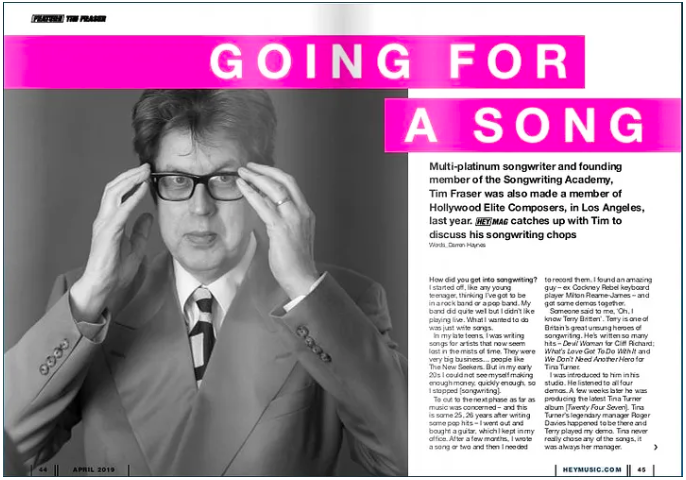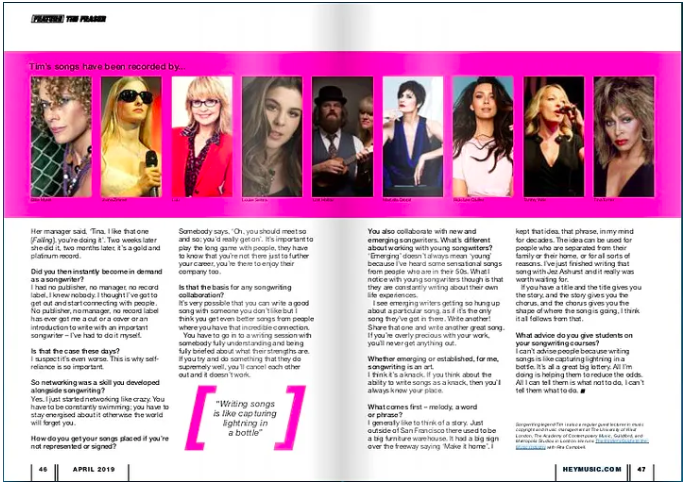


Multi-platinum songwriter and founding member of the Songwriting Academy, Tim Fraser was also made a member of Hollywood Elite Composers, in Los Angeles, last year. Hey Mag catches up with Tim to discuss his songwriting chops. Words Darren Haynes [First published in Hey Mag, April 2019]
How did you get into songwriting?
I started off, like any young teenager, thinking I’ve got to be in a rock band or a pop band. My band did quite well but I didn’t like playing live. What I wanted to do was just write songs.
In my late teens, I was writing songs for artists that now seem lost in the mists of time. They were very big business… people like The New Seekers. But in my early 20s I could not see myself making enough money, quickly enough, so I stopped [songwriting].
To cut to the next phase as far as music was concerned — and this is some 25, 26 years after writing some pop hits — I went out and bought a guitar, which I kept in my office. After a few months, I wrote a song or two and then I needed to record them. I found an amazing guy — ex Cockney Rebel keyboard player Milton Reame-James — and got some demos together.
Someone said to me, ‘Oh, I know Terry Britten’. Terry is one of Britain’s great unsung heroes of songwriting. He’s written so many hits — Devil Woman for Cliff Richard; What’s Love Got To Do With It and We Don’t Need Another Hero for Tina Turner.
I was introduced to him in his studio. He listened to all four demos. A few weeks later he was producing the latest Tina Turner album [Twenty Four Seven]. Tina Turner’s legendary manager Roger Davies happened to be there and Terry played my demo. Tina never really chose any of the songs, it was always her manager.
Her manager said, ‘Tina, I like that one [Falling], you’re doing it’. Two weeks later she did it, two months later, it’s a gold and platinum record.
Did you then instantly become in demand as a songwriter?
I had no publisher, no manager, no record label, I knew nobody. I thought I’ve got to get out and start connecting with people. No publisher, no manager, no record label has ever got me a cut or a cover or an introduction to write with an important songwriter — I’ve had to do it myself.
Is that the case these days?
I suspect it’s even worse. This is why self-reliance is so important.
So networking was a skill you developed alongside songwriting?
Yes, I just started networking like crazy. You have to be constantly swimming; you have to stay energised about it otherwise the world will forget you.
How do you get your songs placed if you’re not represented or signed?Somebody says, ‘Oh, you should meet so and so; you’d really get on’. It’s important to play the long game with people, they have to know that you’re not there just to further your career, you’re there to enjoy their company too.
Is that the basis for any songwriting collaboration?
It’s very possible that you can write a good song with someone you don’t like but I think you get even better songs from people where you have that incredible connection.
You have to go in to a writing session with somebody fully understanding and being fully briefed about what their strengths are. If you try and do something that they do supremely well, you’ll cancel each other out and it doesn’t work.
You also collaborate with new and emerging songwriters. What’s different about working with young songwriters?
‘Emerging’ doesn’t always mean ‘young’ because I’ve heard some sensational songs from people who are in their 50s. What I notice with young songwriters though is that they are constantly writing about their own life experiences.
I see emerging writers getting so hung up about a particular song, as if it’s the only song they’ve got in there. Write another! Share that one and write another great song. If you’re overly precious with your work, you’ll never get anything out.
Whether emerging or established, for me, songwriting is an art.
I think it’s a knack. If you think about the ability to write songs as a knack, then you’ll always know your place.
What comes first — melody, a word or phrase?
I generally like to think of a story. Just outside of San Francisco there used to be a big furniture warehouse. It had a big sign over the freeway saying ‘Make it home’. kept that idea, that phrase, in my mind for decades. The idea can be used for people who are separated from their family or their home, or for all sorts of reasons. I’ve just finished writing that song with Jez Ashurst and it really was worth waiting for.
If you have a title and the title gives you the story, and the story gives you the chorus, and the chorus gives you the shape of where the song is going, I think it all follows from that.
What advice do you give students on your songwriting courses?
I can’t advise people because writing songs is like capturing lightning in a bottle. It’s all a great big lottery. All I’m doing is helping them to reduce the odds. All I can tell them is what not to do, I can’t tell them what to do.
Songwriting legend Tim is also a regular guest lecturer in music copyright and music management at The University of West London, The Academy of Contemporary Music, Guildford, and Metropolis Studios in London. He runs The Insider’s Guide to the Music Industry with Rita Campbell.